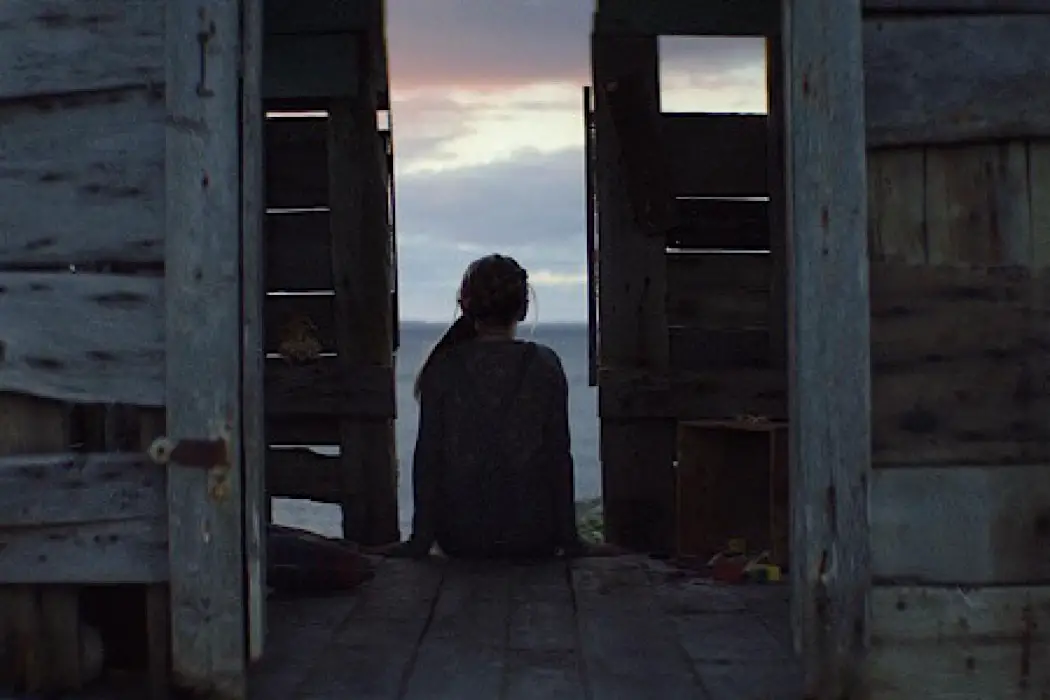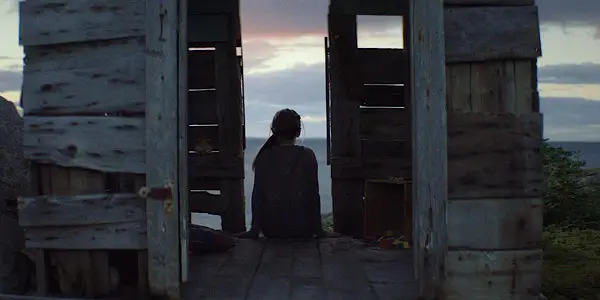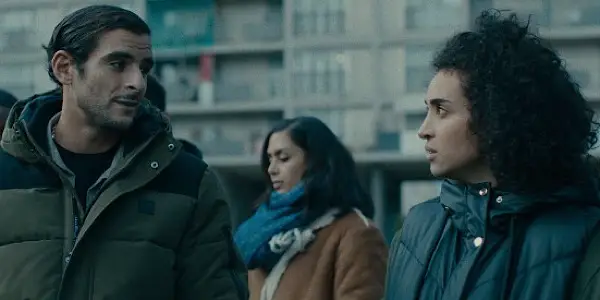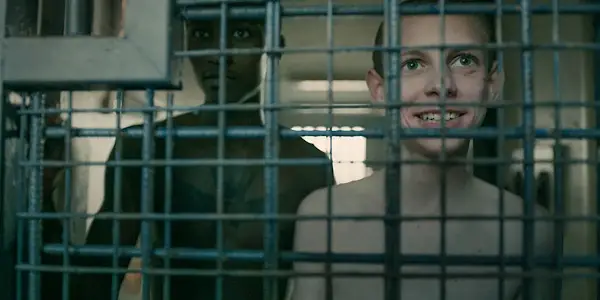Toronto International Film Festival: 2023: THE KING TIDE, AFTER THE FIRE, AN ENDLESS SUNDAY & BAD BOY

Kristy Strouse is the Owner/Editor in Chief of Film Inquiry,…
My second report brings with it three wildly different films, all bold in their individual ways. As well as a new television show that makes its own waves.
The King Tide (Christian Sparkes)

The King Tide is an intriguing phenomenon of a film that left me wanting more. It explores the intricate dance between power, perception, and the implications that can arise. This film is a dramatic and symbolic tour de force that seamlessly intertwines its narrative with a profound exploration of the importance of perception.
In a secluded island setting, we meet The Mayor, Bobby (masterfully portrayed by Clayne Crawford), who saves an infant from the wreckage of a doomed ship. Alongside his wife, Grace (the talented Lara Jean Chorostecki), they adopt and raise the enigmatic child, Isla (brought to life by Alix West Lefler).
A decade has elapsed, and the insular community is profoundly intertwined with Isla, who stands as a beacon of healing and a conduit to nature. The islanders hang on her every word and accompany her on maritime adventures, gathering fish. Her presence, it appears, isolates the community from the mainland’s influence while fostering an environment of growth and prosperity. Yet, this harmony is disrupted…
A child’s injury, beyond Isla’s healing reach, triggers a wave of uncertainty about her dwindling powers. This event ignites a tumultuous discourse among the community, raising queries about her evolving abilities and the subsequent impact on their island sanctuary.
This unsettling event spirals into a maelstrom of violence and hysteria, revealing the desperate measures some may resort to when their envisioned utopia begins to crumble. It unearths the stark reality of human nature, teetering precariously between light and shadow.
However, the narrative transcends the mystical attributes of this mysterious child. Despite her unique abilities, Isla, as depicted by Alix West Lefler, remains an ordinary girl, portrayed with exceptional subtlety and sincerity. Crawford embodies the doting, protective father with authenticity and conviction, thus cultivating one of the film’s most compelling relational dynamics. Frances Fisher also gives a stellar supporting turn.
The narrative’s grounding elements juxtapose the extraordinary with the ordinary, normalizing the surreal within the boundaries of this remote island society.
The King Tide is a cinematic tempest, a film that continues to unfold, that will certainly reveal deeper layers of meaning with each viewing. It’s a provocative and poignant narrative that simmers slowly, taking its time before steadily building towards a climactic inferno. The King Tide is fantastically unsettling.
After the Fire (Mehdi Fikri)

After the Fire, an intellectually stimulating and emotionally resonant film crafted by the talented writer and director Mehdi Fikri, offers a penetrating exploration of the pervasive racism endured by the Arab community. Set against the backdrop of Strasbourg, France, Fikri‘s fictional narrative skillfully mirrors the harsh realities faced by many individuals.
The tragic death of Karim, erroneously attributed to a drug-induced seizure during his time in police custody, acts as a powerful catalyst for his grieving family’s tireless pursuit of truth and justice. Amidst the daunting challenges they face, it is the character of Malika, portrayed with exceptional talent by Camélia Jordana, who emerges as the film’s centerpiece.
The film’s opening sequences immediately seize the viewer’s attention with their arresting and surreal imagery of flames. These visuals, expertly captured by the accomplished cinematographer Romain Carcanade, linger in the mind long after the credits roll.
Carcanade‘s astute implementation of a range of techniques, from intimate close-ups to impressionistic shots, serves to engross the audience, drawing them into the story on a deep and thought-provoking level.
Malika’s unwavering determination and resilience not only provide a source of strength for her family but also propels the narrative forward, infusing it with a sense of urgency and purpose.
After the Fire stands as a compelling call to action, evoking a potent mix of frustration, righteous anger, and a deep yearning for societal change. Through its candid exploration of the injustices faced by marginalized communities, the film prompts introspection and fosters a profound understanding of the need for empathy and equality.
Some of the scenes work better than others and the film could benefit from less of a runtime. The supporting roles aren’t as effective and some moments feel too procedurally placed, but there’s a promising future for the director and a compelling narrative to withhold.
An Endless Sunday (Alain Parroni)

An Endless Sunday masterfully intertwines elements of romanticism and danger, capturing the ephemeral nature of youth and the profound consequences of each fleeting moment. The film’s visually electric aesthetics and evocative musical choices transport viewers to a bygone era, paying homage to classic cinema while still embodying a distinctly millennial sensibility.
At its core, the narrative revolves around three central characters: Alex (Enrico Bassetti), his girlfriend Brenda (Federica Valentini) who has just learned she is pregnant, and exuberant Kevin (Zackary Delmas). These three are the central focus of the film as their wild daily excursions and individual secrets come out. They act as though they own the city, and do what they will.
There is also the presence of an elderly German sheep farmer and small-time criminal, serving as Alex’s mentor figure, which adds a captivating layer of complexity to the storyline.
Andrea Benjamin Manenti showcases a unique and visionary approach to cinematography, skillfully weaving together a tapestry of textures, colors, and varying levels of realism. The film effortlessly transitions between gritty realism and mesmerizing moments of fantasy, accentuated by an impeccable selection of music.
While An Endless Sunday effectively captures the essence of youth and the audacious nature of its characters as they navigate the city with a sense of entitlement, it could benefit from a more streamlined narrative. The film’s runtime occasionally detracts from its overall focus and impact.
The film delves into thought-provoking territory, drawing inspiration from cinematic gems such as Jules and Jim and The Dreamers. Each is from various times in cinema’s history, which makes this comparable revisiting fascinating.
The characters’ flaws and relatability to contemporary youth are simultaneously infuriating and captivating. In one instant I wanted to turn it off and in another, I was hooked.
An Endless Sunday resides within the realm of expressionistic arthouse cinema, which may not resonate with all audiences. It is an unapologetically immersive and introspective experience that makes you feel as if you are simultaneously watching two different movies.
Regardless of its divisive nature, the film leaves an indelible mark on you, lingering long after the credits roll. Its final act takes some dark and edgy turns, sometimes too ambitious for its own good.
An Endless Sunday is a visually arresting and intellectually stimulating exploration of the complexities of youth and the relentless pursuit of self-discovery. It dares to challenge and provoke, and director Alain Parroni doesn’t hold back. This film may be a frenetic and infuriating at times, but it’s a hell of a ride.
Bad Boy

For TIFF this year I was able to screen the first two episodes of Bad Boy, a riveting story about a troubled youth and his journey behind bars.
Dean (Guy Menaster) is a troubled teen, turned in by his mother Tamara (Neta Plotnick), and sent to juvenile detention. Inside he makes a friend and witnesses a crime, placing him front and center in a place where you want to be invisible.
The narrative begins with a focus on our protagonist, poised but introspective. It swiftly draws us back into the transformative moment that irreversibly altered his life’s trajectory.
Caught between the proverbial rock and a hard place, he finds himself ensnared in a perilous predicament. The act of speaking out is fraught with danger, yet maintaining silence carries its own risks and ensures his time behind bars.
The narrative is punctuated by moments of levity, careful not to overshadow the profound gravity of incarceration. The portrayal is raw and visceral, encapsulating the stark reality of young lives caught in untenable circumstances. Guy Menaster gives a fantastic performance, commanding the screen at every turn.
Cheli (Liraz Chamami), the warden, takes a shine to him (and yet seems to enjoy throwing him to the wolves) and his friend Zoro (Havtamo Freda) begins to help as he navigates these new waters.
With only two episodes available as a tantalizing preview, the viewer is adeptly drawn into the narrative’s vortex. It lures us into the turbulent reality of prison life, compelling us to confront the internal struggles one might grapple with within such confines. I found myself quite taken with the series so far.
Bad Boy is a layered and inviting rush of a series, punctuating these first two with a tease of an entertaining future story to come.
The first two episodes of Bad Boy screened at the Toronto International Film Festival.
Does content like this matter to you?
Become a Member and support film journalism. Unlock access to all of Film Inquiry`s great articles. Join a community of like-minded readers who are passionate about cinema - get access to our private members Network, give back to independent filmmakers, and more.
Kristy Strouse is the Owner/Editor in Chief of Film Inquiry, writer, podcaster, and all around film and TV fanatic. She's also VP of Genomic Operations at Katch Data and is a member of The Online Association of Female Film Critics and The Hollywood Creative Alliance. She also has a horror website: Wonderfully Weird & Horrifying.













